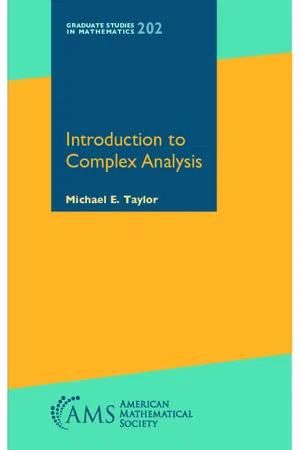Introduction to Complex Analysis
About this book
In this text, the reader will learn that all the basic functions that arise in calculus—such as powers and fractional powers, exponentials and logs, trigonometric functions and their inverses, as well as many new functions that the reader will meet—are naturally defined for complex arguments. Furthermore, this expanded setting leads to a much richer understanding of such functions than one could glean by merely considering them in the real domain. For example, understanding the exponential function in the complex domain via its differential equation provides a clean path to Euler's formula and hence to a self-contained treatment of the trigonometric functions. Complex analysis, developed in partnership with Fourier analysis, differential equations, and geometrical techniques, leads to the development of a cornucopia of functions of use in number theory, wave motion, conformal mapping, and other mathematical phenomena, which the reader can learn about from material presented here.This book could serve for either a one-semester course or a two-semester course in complex analysis for beginning graduate students or for well-prepared undergraduates whose background includes multivariable calculus, linear algebra, and advanced calculus.
Tools to learn more effectively

Saving Books

Keyword Search

Annotating Text

Listen to it instead
Information
Table of contents
- Cover
- Title page
- Preface
- Some basic notation
- Chapter 1. Basic calculus in the complex domain
- Chapter 2. Going deeper –the Cauchy integral theorem and consequences
- Chapter 3. Fourier analysis and complex function theory
- Chapter 4. Residue calculus, the argument principle, and two very special functions
- Chapter 5. Conformal maps and geometrical aspects of complex function theory
- Chapter 6. Elliptic functions and elliptic integrals
- Chapter 7. Complex analysis and differential equations
- Appendix A. Complementary material
- Bibliography
- Index
- Back Cover
Frequently asked questions
- Essential is ideal for learners and professionals who enjoy exploring a wide range of subjects. Access the Essential Library with 800,000+ trusted titles and best-sellers across business, personal growth, and the humanities. Includes unlimited reading time and Standard Read Aloud voice.
- Complete: Perfect for advanced learners and researchers needing full, unrestricted access. Unlock 1.4M+ books across hundreds of subjects, including academic and specialized titles. The Complete Plan also includes advanced features like Premium Read Aloud and Research Assistant.
Please note we cannot support devices running on iOS 13 and Android 7 or earlier. Learn more about using the app
